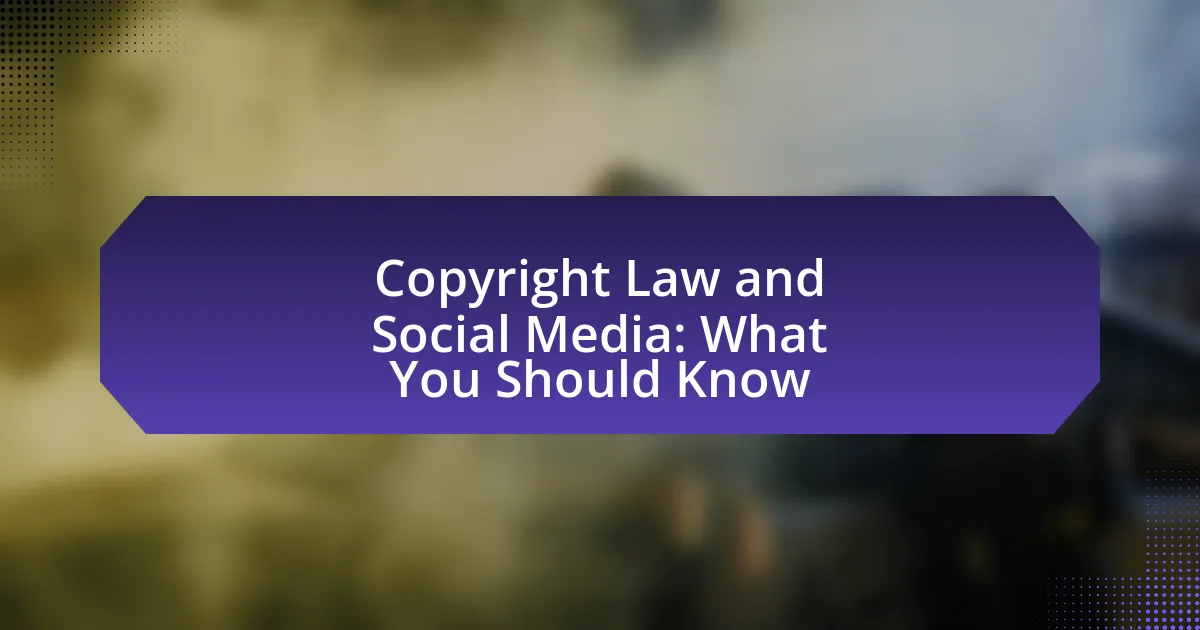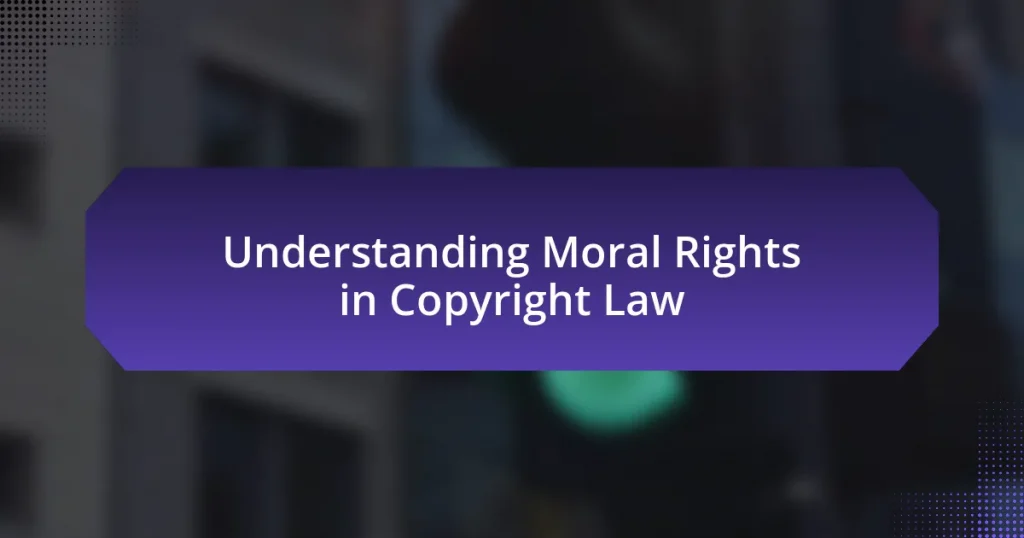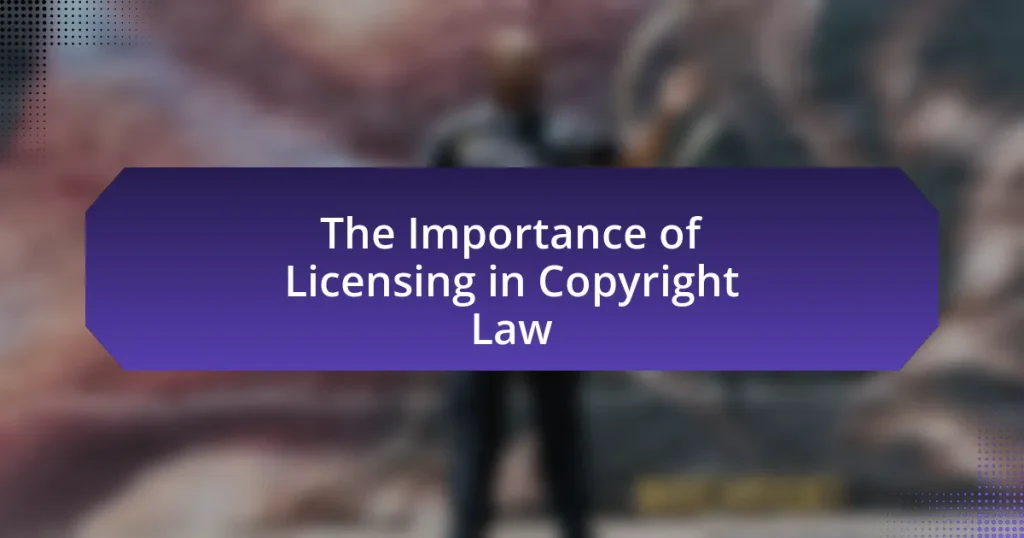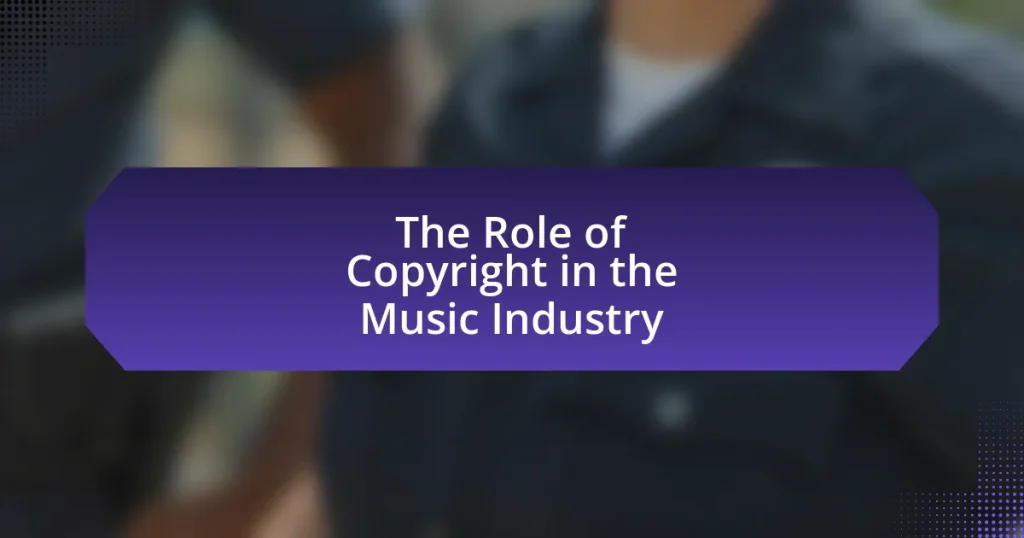Copyright law in the context of social media encompasses the legal protections for original works shared on platforms like Facebook, Instagram, and YouTube. This article outlines how copyright law applies to user-generated content, the types of content protected, and the differences in copyright policies across various platforms. It emphasizes the importance of understanding copyright to avoid legal issues, the potential consequences of infringement, and the rights of copyright holders. Additionally, it discusses fair use, licensing, and best practices for users to navigate copyright challenges effectively while protecting their own content. Resources for further understanding copyright law and obtaining legal advice are also provided.
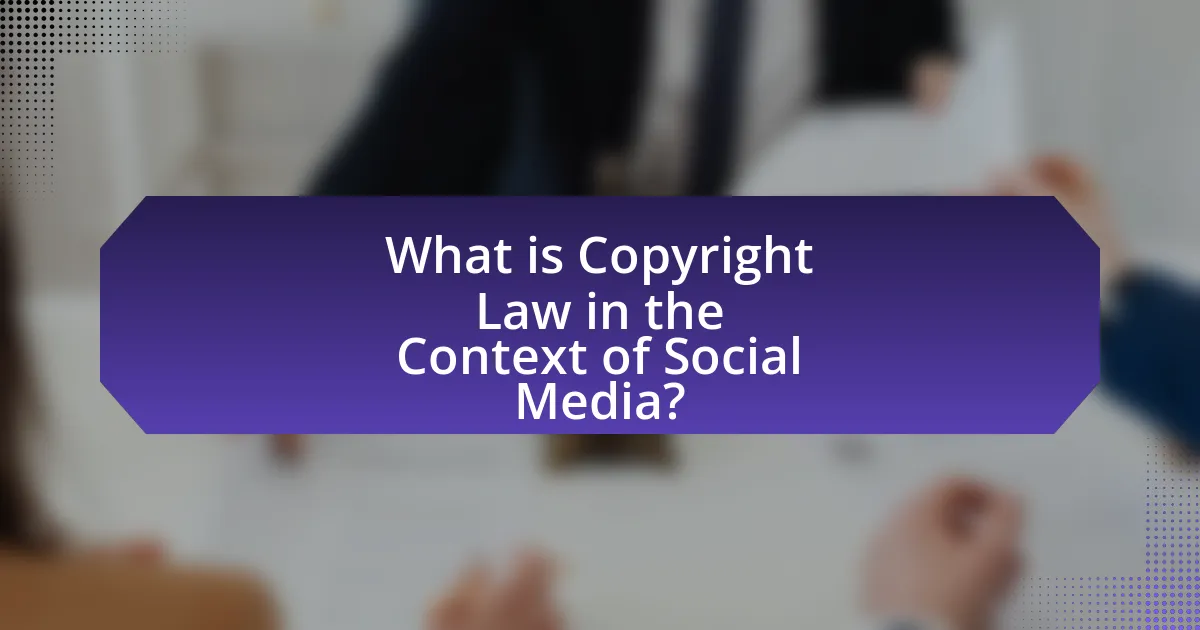
What is Copyright Law in the Context of Social Media?
Copyright law in the context of social media refers to the legal framework that protects original works of authorship shared on social media platforms. This law grants creators exclusive rights to their content, such as images, videos, and text, preventing unauthorized use or reproduction. For instance, under the U.S. Copyright Act, creators automatically receive copyright protection upon the creation of their work, which means that sharing or reposting someone else’s content without permission can lead to copyright infringement claims. Social media platforms often have policies in place to address copyright violations, including the Digital Millennium Copyright Act (DMCA) provisions that allow copyright holders to request the removal of infringing content.
How does copyright law apply to content shared on social media platforms?
Copyright law applies to content shared on social media platforms by granting creators exclusive rights to their original works, which includes text, images, videos, and music. When users post content on social media, they typically retain copyright ownership, but they also grant the platform a license to use that content under the platform’s terms of service. This means that while users can control their original works, they must also be aware that sharing content may allow the platform to redistribute or modify it without further permission. According to the U.S. Copyright Office, copyright protection is automatic upon the creation of a work, and users should be cautious about sharing copyrighted material without permission, as unauthorized use can lead to copyright infringement claims.
What types of content are protected under copyright law?
Copyright law protects various types of content, including literary works, musical compositions, dramatic works, audiovisual works, and artistic works. Specifically, literary works encompass books, articles, and poems; musical compositions include both the music and lyrics; dramatic works cover plays and screenplays; audiovisual works consist of films and videos; and artistic works involve paintings, sculptures, and photographs. These protections are established under the U.S. Copyright Act of 1976, which grants creators exclusive rights to reproduce, distribute, and display their works, thereby ensuring that their intellectual property is safeguarded against unauthorized use.
How do copyright laws differ across various social media platforms?
Copyright laws differ across various social media platforms primarily in terms of user-generated content ownership and the enforcement of copyright policies. For instance, platforms like Facebook and Instagram typically require users to grant them a broad license to use uploaded content, which can lead to disputes over ownership rights. In contrast, platforms such as YouTube have specific policies that allow content creators to monetize their work while still retaining ownership, as long as they comply with copyright regulations. Additionally, TikTok has unique provisions that allow for the use of copyrighted music in user videos, which is facilitated through licensing agreements with music rights holders. These differences highlight how each platform’s terms of service and copyright enforcement mechanisms can significantly impact users’ rights and responsibilities regarding their content.
Why is understanding copyright law important for social media users?
Understanding copyright law is crucial for social media users because it helps them avoid legal issues related to the unauthorized use of protected content. Social media platforms are filled with user-generated content, and without knowledge of copyright, users may inadvertently infringe on the rights of creators, leading to potential lawsuits or account suspensions. For instance, according to the U.S. Copyright Office, using copyrighted material without permission can result in statutory damages ranging from $750 to $30,000 per work infringed. Therefore, being informed about copyright law enables users to navigate content sharing responsibly and respect intellectual property rights.
What are the potential consequences of copyright infringement on social media?
Copyright infringement on social media can lead to legal consequences, including lawsuits, financial penalties, and account suspension. When users post copyrighted material without permission, copyright holders can file claims, resulting in potential damages that may reach thousands of dollars, as seen in cases like the 2018 lawsuit against a popular social media influencer for unauthorized use of music. Additionally, platforms like Facebook and Instagram enforce strict copyright policies, which can lead to the removal of infringing content and the suspension of user accounts after repeated violations.
How can knowledge of copyright law protect creators and users?
Knowledge of copyright law protects creators by granting them exclusive rights to their original works, allowing them to control how their creations are used and distributed. This legal framework ensures that creators can receive recognition and financial compensation for their efforts, which incentivizes further creativity and innovation. For users, understanding copyright law helps them navigate the legal landscape when using or sharing content, reducing the risk of infringement and potential legal consequences. For instance, the U.S. Copyright Act of 1976 provides specific protections that empower creators while outlining fair use provisions that allow users to utilize copyrighted material under certain conditions, thus balancing the interests of both parties.
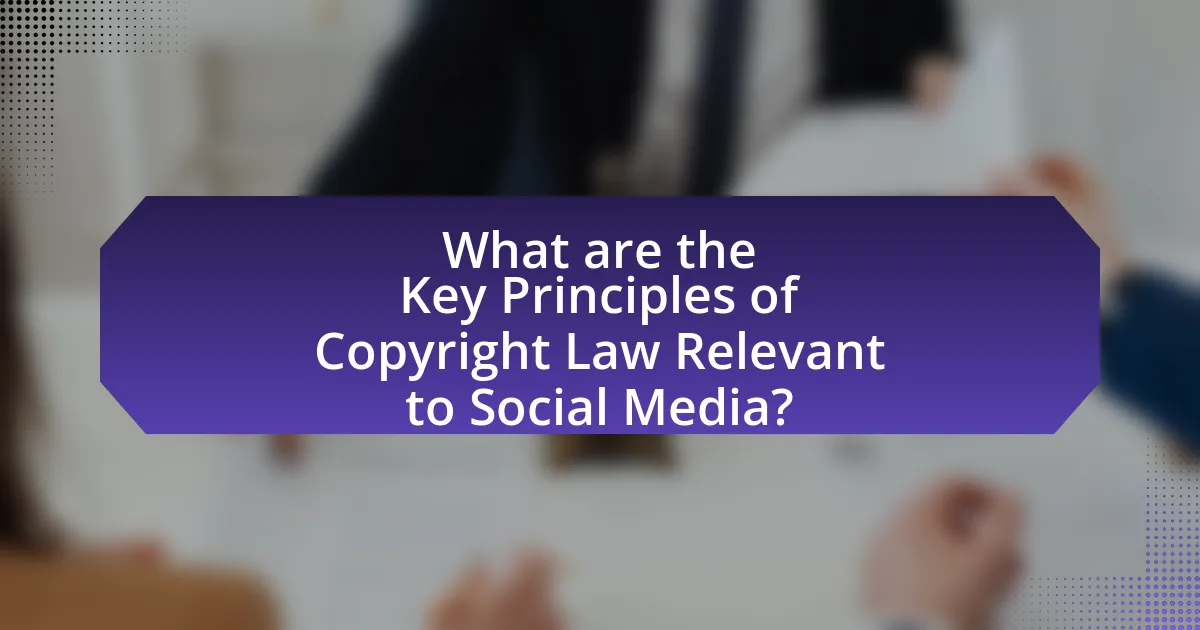
What are the Key Principles of Copyright Law Relevant to Social Media?
The key principles of copyright law relevant to social media include the protection of original works, the concept of fair use, and the responsibilities of users and platforms regarding copyright infringement. Copyright law protects original works of authorship, such as text, images, and videos, from unauthorized use, meaning that creators retain exclusive rights to their content. Fair use allows limited use of copyrighted material without permission for purposes such as criticism, comment, news reporting, teaching, scholarship, or research, but the application of fair use is determined on a case-by-case basis. Additionally, social media platforms are required to implement measures to address copyright infringement, including responding to takedown notices under the Digital Millennium Copyright Act (DMCA), which mandates that platforms remove infringing content when notified by copyright holders.
What rights do copyright holders have over their content on social media?
Copyright holders have exclusive rights over their content on social media, including the right to reproduce, distribute, display, and perform their work. These rights are protected under copyright law, which grants creators control over how their content is used and shared. For instance, copyright holders can prevent unauthorized use of their content by others, including reposting or commercial use without permission. Additionally, social media platforms typically have policies in place that allow copyright holders to report infringements, leading to potential removal of infringing content. This legal framework ensures that creators maintain ownership and can seek remedies for violations of their rights.
How can copyright holders enforce their rights on social media platforms?
Copyright holders can enforce their rights on social media platforms by utilizing the Digital Millennium Copyright Act (DMCA) takedown process. This legal framework allows copyright owners to submit a formal notice to the platform, requesting the removal of infringing content. Social media platforms, such as Facebook and YouTube, are required to respond to these notices promptly to avoid liability for hosting infringing material. According to the U.S. Copyright Office, over 1.5 million DMCA takedown notices were filed in 2020, demonstrating the effectiveness of this enforcement mechanism. Additionally, copyright holders can monitor their content using automated tools and report violations directly to the platforms, further strengthening their enforcement efforts.
What is the role of fair use in social media content sharing?
Fair use plays a crucial role in social media content sharing by allowing users to utilize copyrighted material without permission under certain conditions. This legal doctrine enables individuals to share, comment on, or critique existing content, fostering creativity and dialogue. For instance, the four factors of fair use—purpose and character of use, nature of the copyrighted work, amount used, and effect on the market—guide whether a specific use qualifies as fair. Courts have upheld fair use in cases like Campbell v. Acuff-Rose Music, Inc., where transformative use was deemed permissible, illustrating that social media users can share content for commentary or educational purposes without infringing copyright.
How do licensing and permissions work in the context of social media?
Licensing and permissions in the context of social media involve the legal rights granted to users for the use of content created by others. Social media platforms typically require users to obtain permission or a license to use copyrighted material, such as images, videos, and music, to avoid infringement. For instance, when users upload content, they often grant the platform a license to use that content, which is outlined in the platform’s terms of service. This license allows the platform to display, share, and promote the content while the original creator retains ownership. Additionally, users must be aware of copyright laws that protect original works, as unauthorized use can lead to legal consequences. According to the U.S. Copyright Office, copyright law protects original works of authorship, and users should seek permission from the copyright holder or use content that is licensed under Creative Commons or in the public domain to ensure compliance.
What are the different types of licenses available for social media content?
The different types of licenses available for social media content include Creative Commons licenses, proprietary licenses, and public domain licenses. Creative Commons licenses allow creators to specify how their content can be used by others, with options ranging from allowing any use with attribution to restricting commercial use or derivative works. Proprietary licenses grant specific rights to users under defined conditions, often requiring payment or adherence to strict usage guidelines. Public domain licenses enable content to be freely used by anyone without restrictions, as the creator has relinquished all rights. These licensing options are essential for navigating copyright law in social media, ensuring that creators can protect their work while allowing for various levels of sharing and reuse.
How can users obtain permission to use copyrighted material on social media?
Users can obtain permission to use copyrighted material on social media by directly contacting the copyright owner to request a license or permission. This process typically involves identifying the owner of the material, which can often be found through copyright notices or databases, and then clearly stating the intended use, duration, and scope of the request. According to the U.S. Copyright Office, obtaining permission is essential to avoid infringement, as using copyrighted material without consent can lead to legal consequences.
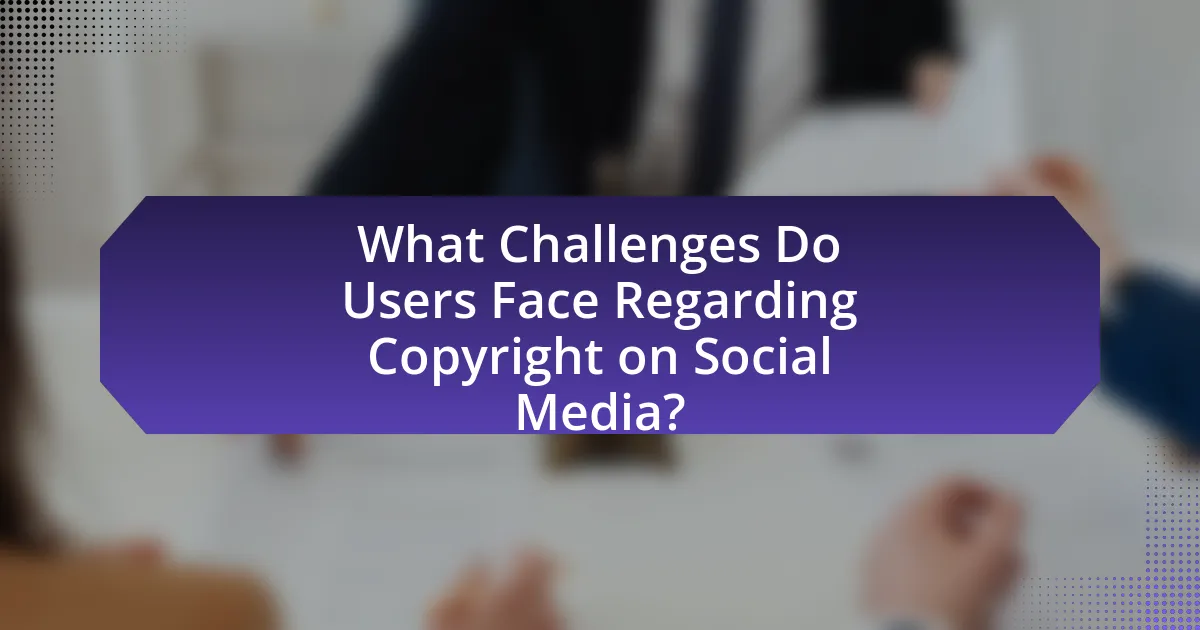
What Challenges Do Users Face Regarding Copyright on Social Media?
Users face several challenges regarding copyright on social media, primarily due to the complexity of copyright laws and the ease of content sharing. One significant challenge is the lack of clarity about what constitutes fair use, leading to confusion over whether users can share or modify content without permission. Additionally, users often encounter automated copyright enforcement systems that may incorrectly flag or remove their content, resulting in frustration and potential loss of access to their accounts. According to a 2021 study by the Electronic Frontier Foundation, over 50% of users reported experiencing issues with content removal due to copyright claims, highlighting the prevalence of this challenge. Furthermore, many users are unaware of their rights and the potential consequences of copyright infringement, which can lead to legal repercussions.
What common misconceptions exist about copyright law and social media?
Common misconceptions about copyright law and social media include the belief that sharing content on social media automatically grants permission to use it, and that all content posted online is free to use without consequences. Many users assume that simply crediting the original creator protects them from copyright infringement, which is not true. Copyright law protects original works, and unauthorized use can lead to legal action regardless of attribution. Additionally, some people think that content becomes public domain after being shared on social media, but copyright remains with the creator unless explicitly stated otherwise. These misconceptions can lead to unintentional violations of copyright law, highlighting the importance of understanding the legal implications of sharing content online.
How do these misconceptions lead to copyright violations?
Misconceptions about copyright often lead individuals to believe that they can freely use copyrighted material without permission, resulting in copyright violations. For instance, the belief that sharing content on social media constitutes fair use can prompt users to repost images, videos, or music without obtaining the necessary rights, thereby infringing on the original creator’s copyright. According to a study by the U.S. Copyright Office, a significant percentage of social media users are unaware of copyright laws, which contributes to the prevalence of unauthorized sharing and reproduction of protected works.
What are the challenges in identifying copyright infringement on social media?
Identifying copyright infringement on social media presents significant challenges due to the vast amount of user-generated content and the rapid pace at which it is shared. The sheer volume of posts makes it difficult for copyright holders to monitor and enforce their rights effectively. Additionally, the use of algorithms and automated systems by social media platforms can lead to inconsistencies in identifying infringing content, as these systems may not accurately recognize context or fair use exceptions. Furthermore, the anonymity of users complicates enforcement actions, as it can be challenging to trace the original source of infringing material. Legal frameworks also vary by jurisdiction, adding another layer of complexity to enforcement efforts.
How can users navigate copyright issues effectively on social media?
Users can navigate copyright issues effectively on social media by understanding and adhering to copyright laws, utilizing original content, and seeking permission for any third-party materials. Familiarity with the Digital Millennium Copyright Act (DMCA) helps users recognize their rights and responsibilities, as it provides a framework for addressing copyright infringement online. Additionally, using tools like Creative Commons licenses allows users to share and use content legally while respecting the rights of original creators. Engaging in proper attribution and crediting sources further mitigates the risk of copyright violations.
What best practices should users follow to avoid copyright infringement?
To avoid copyright infringement, users should always seek permission from the copyright holder before using any copyrighted material. This practice ensures that users respect the rights of creators and comply with copyright laws. Additionally, users should familiarize themselves with the concept of fair use, which allows limited use of copyrighted material without permission under specific circumstances, such as criticism, comment, news reporting, teaching, scholarship, or research. Users should also consider using public domain works or materials licensed under Creative Commons, which often allow for reuse with certain conditions. Furthermore, users should provide proper attribution when using someone else’s work, even if it falls under fair use or is licensed for reuse. Following these best practices helps users navigate copyright issues effectively and minimizes the risk of legal repercussions.
How can users protect their own content from being misused on social media?
Users can protect their own content from being misused on social media by implementing copyright notices and utilizing privacy settings. Copyright notices inform others that the content is protected, which can deter unauthorized use. Additionally, adjusting privacy settings allows users to control who can view and share their content, reducing the risk of misuse. According to the U.S. Copyright Office, original works are automatically protected by copyright upon creation, reinforcing the importance of these measures in safeguarding intellectual property.
What resources are available for understanding copyright law on social media?
Resources for understanding copyright law on social media include government websites, legal textbooks, online courses, and industry-specific guides. The U.S. Copyright Office provides comprehensive information on copyright laws and regulations, while platforms like Coursera and edX offer courses on intellectual property law. Additionally, organizations such as the Electronic Frontier Foundation publish articles and guides that specifically address copyright issues in the context of social media. These resources are validated by their authoritative nature and relevance to current copyright practices.
Where can users find legal advice regarding copyright issues on social media?
Users can find legal advice regarding copyright issues on social media through various resources such as legal websites, law firms specializing in intellectual property, and online legal forums. Websites like the American Bar Association and the Copyright Office provide comprehensive information and guidance on copyright laws. Additionally, consulting with attorneys who focus on copyright law can offer personalized legal advice tailored to specific situations. Online platforms like Avvo and LegalZoom also connect users with legal professionals who can address copyright concerns related to social media usage.
What online tools can help users manage copyright compliance on social media?
Online tools that can help users manage copyright compliance on social media include services like Creative Commons, which provides licenses that allow creators to specify how their work can be used, and tools like Copyright Clearance Center, which offers licensing solutions for various types of content. Additionally, platforms such as YouTube’s Content ID system automatically detects copyrighted material and helps users manage their rights. These tools are essential for ensuring that users adhere to copyright laws while sharing content on social media, as they provide clear guidelines and automated systems for compliance.
